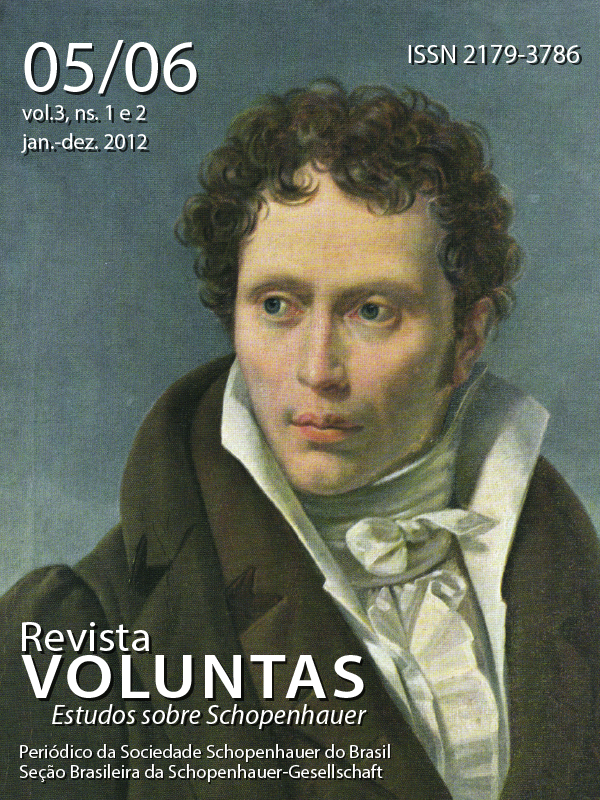A gênese do sistema de Filosofia Transcendental de Schopenhauer
DOI:
https://doi.org/10.5902/2179378634042Palabras clave:
Schopenhauer, Filosofia transcendental, ReinholdResumen
Neste artigo é apresentada a tese segundo a qual parte do projeto filosófico de Arthur Schopenhauer deve ser entendida como o estabelecimento de um sistema de filosofia transcendental, constituído de uma teoria da experiência coordenada a uma teoria geral das faculdades cognitivas e a um “primeiro princípio”, que apresentamos e discutimos. Assim compreendida, a filosofia de Schopenhauer guarda uma relação peculiar de continuidade com a filosofia transcendental de Kant: herda e reformula o projeto de Karl Leonhard Reinhold, articulado em resposta aos céticos Salomon Maimon e Gottlob Ernst Schulze, edificando um sistema de filosofia transcendental que contempla as ambições fundacionistas presentes no projeto de Reinhold e críticas que esse projeto receberaDescargas
Citas
SCHOPENHAUER, A. Sämtliche Werke. Pustet, Friederich, Stuttgart-Frankfurt am Main, Cotta-Insel Verlag, in fünf Bänden, 1960.
SCHOPENHAUER, A. Die Welt als Wille und Vorstellung I. In: SCHOPENHAUER, A Sämtliche Werke – BandI. Stuttgart-Frankfurt am Main: Cotta-Insel Verlag, 1960.
SCHOPENHAUER, A. Die Welt als Wille und Vorstellung II. In: SCHOPENHAUER, A. Sämtliche Werke – Band II, Stuttgart-Frankfurt am Main, Cotta-Insel Verlag, 1960.
SCHOPENHAUER, A. Über die Vierfache Wurzel des Satzes vom Zureichenden Grunde. In: SCHOPENHAUER, A. Sämtliche Werke – Band III, p. 6-190. Stuttgart-Frankfurt am Main, Cotta-Insel Verlag,1960.
SCHOPENHAUER, A. Parerga und Paralipomena I. In: SCHOPENHAUER, A. Sämtliche Werke – Band IV.
Stuttgart-Frankfurt am Main: Cotta-Insel Verlag, 1960.
SCHOPENHAUER, A. On the Fourfold Root of the Principle of Sufficient Reason (FR), La Salle: Open
Court Press, Translator: PAYNE, E.F.J., 1974.
SCHOPENHAUER, A. The World as Will and Representation (in two volumes), New York: Dover
Publications, Translator: PAYNE, E.F.J., 1969.
SCHOPENHAUER, A. O mundo como vontade e representação98, Rio de Janeiro: Contraponto Editora, Tradução: CORREIA, S. M. F., 2001.
SCHOPENHAUER, A. O mundo como vontade e como representação. São Paulo: Editora UNESP, 2005.
KANT, I. Kant’s Briefwechsel, Band II. Kant´s gesammelte Schriften. Akademie-Ausgabe (Ak). Band XI. Berlin und Leipzig: Walter de Gruyter, 1922.
KANT, I. Kritik der reinen Vernunft, 1781 (A), 1787 (B), In: Kant im Kontext - Werke auf CD-ROM, Karsten Worm – Info Software, 1996.
KANT, I. Immanuel Kant’s Critique of Pure Reason, St. Martin’s Press, Translation: SMITH, N.K., 1970.
KANT, I. Crítica da Razão Pura, Lisboa: Fundação Calouste Gulbekian, Tradução: DOS SANTOS, M.P.
& MORUJÂO, A. F., 2001.
MAIMON, S. Versuch über die Transscendentalphilosophie mit einem Anhang über die symbolische Erkenntniß und nmerkungen, Berlin, 1790.
MAIMON, S. Versuch einer neuen Logik oder Theorie des Denkens: Nebst Angehängten Briefen des
Philaletes an Änesidemus, Berlin, 1794.
REINHOLD, K. L. Beyträge zur Berichtigung bisheriger Meißverständnisse der Philosophen. Bd.I,Hamburg hflix Meiner Verlag, 2003 [1790].
SCHULZE, G. E. Änesidemus oder über die Fundamente der von Herrn Professor Reinhold in Jena gelieferten Elementar-Philosophie, Hamburg: Felix Meiner Verlag, 1996 [1792].
AMERIKS, K. “On Being Neither Post- Nor Anti-Kantian”, Inquiry: An Interdisciplinary Journal of
Philosophy, 46 (2): 272-92, 2003.
AMERIKS, K. Cambridge Companion to German Idealism, Cambridge: Cambridge University Press,
AMERIKS, K. Introduction: Interpreting German Idealism, In: AMERIKS, K. Cambridge Companion to
German Idealism, Cambridge: Cambridge University Press, p. 1-17, 2000.
BECK, J.S. “Explanatory Abstract of the Critical Writing of Prof. Kant, Prepared with the Same, V. III
which presents The Sandpoint from which Critical Philosophy is to be Judged”, 1796. In: DI GIOVANNI,
G. and HARRIS, H.S. Between Kant and Hegel: Texts in The Development of Post-Kantian Idealism, p.
-50, Indianapolis, Hackett, 2000.
BEISER, F. The Fate of Reason: German Philosophy from Kant to Fichte. London: Harvard Press, 1987.
BONACCINI, J.A. Kant e o Problema da Coisa em Si no Idealismo Alemão, Rio de Janeiro: Editora Relume Dumará, 2003.
BREAZEALE, D. Two Cheers for Post-Kantianism, Inquiry: An Interdisciplinary Journal of Philosophy, 46 (2): 239-59, 2003.
CASSIRER, E. Das Erkenntnisproblem in der Philosophie und Wissenschaft der Neuren Zeit, Band III: Die Nachkantischen Systeme, Hildesheim: Georg Olms Verlag, 1974. (1923)
DI GIOVANNI, G. and HARRIS, H.S. Between Kant and Hegel: Texts in The Development of Post-Kantian Idealism, p. 2-50, Indianapolis, Hackett, 2000a.
DI GIOVANNI, G. The Facts of The Consciousness, In: DI GIOVANNI, G. and HARRIS, H.S. Between Kant and Hegel: Texts in The Development of Post-Kantian Idealism, p. 2-50, Indianapolis, Hackett, 2000b.
GOODMAN, N. Fact, Fiction and Forecast, Massachusetts: Harvard University Press, 1979.
HARTMANN, N. A Filosofia do Idealismo Alemão, Fundação Calouste Gulbekian, Tradução: BELO, J.
G. 1960.
HENRICH, D. “The Proof-Structure of Kant's Transcendental Deduction”, Review of Metaphysics, 22:4, p.640-59, 1969.
HENRICH, D. Kant’s Notion of a Deduction, In: Kant’s Transcendental Deductions, Stanford: Stanford
University Press, p.30-46, 1989.
HOYOS, L.E. El Escepticismo y la Filosofía Transcendental: Estudios sobre el pensamiento alemán a fines del siglo XVIII, Bogotá, Siglo del Hombres Editores, 2001a.
TELES, A. “Um Ensaio sobre a crítica de Schopenhauer à Doutrina das Categorias de Kant”, Barbarói, n.26, pp.133-159, 2007.
TELES, A. O Sistema de Filosofia Transcendental de Schopenhauer: Uma Interpretação e Defesa. Porto Alegre, 230 p. (Dissertação de Mestrado), UFRGS, 2009.
Descargas
Publicado
Cómo citar
Número
Sección
Licencia
La sumisión de los originales para este periódico implica la transferencia, por parte de autores, de los derechos de publicación impresa y digital. Los derechos autorales para los artículos publicados son del autor, con derechos del periódico sobre la primera publicación. Los autores sólo podrán utilizar los mismos resultados en otras publicaciones indicando claramente este periódico como el medio de publicación original. En virtud de ser un periódico de acceso abierto, está permitido el uso gratuito de los artículos en aplicaciones educacionales, científicas, no comerciales, desde que referenciada la fuente (por favor, vea la licencia Creative Commons en el pie de página de este periódico).






